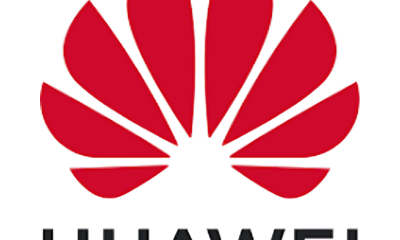InfoTech
Huawei develops Technology to tackle Oil Theft in Nigeria

Chinese technology company, Hauwei Technologies on Tuesday said it had developed an intelligent pipeline monitoring system to help tackle crude oil theft in Nigeria.
Mr Li Wei, Director of Huawei Nigeria Enterprise Business, made this known at a news briefing on the sidelines of the ongoing Nigerian International Energy Summit (NIES) on Tuesday in Abuja.
Wei said: “Huawei-developed fiber vibration intrusion warning system uses Artificial Intelligence to identify intrusion scenarios accurately.
“With high identification precision, accurate positioning, and quick response, it will help to ensure pipeline safety and reduce theft and vandalism.’’
According to him, Huawei will continue to support the digital transformation of Nigeria’s oil and gas industry by developing Information and Communications Technology (ICT) solutions.
“Faced with the ongoing volatility of international oil prices, Huawei believes that the digital transformation of Nigeria’s upstream sector is a top priority.
“In response to the strategy proposed by the Nigerian government and oil companies, Huawei promotes the digital oilfield Internet of Things and Exploration and Production storage solutions.
“This will help oil and gas companies to achieve real-time visualised production, improve production efficiency, reduce production costs, and optimise production resource allocation to improve oilfield production.’’
Wei said in addition to providing high-quality ICT solutions and services, Huawei actively support the Nigerian government in building a talent ecosystem.
He said the company had signed ICT academy agreement with more than 110 universities and schools and had trained more than 1,000 civil servants and 40,000 young students in Nigeria.
“We hope to build a strong talent base camp to promote Nigeria’s digital economy development,’’ Wei added. (NAN)
InfoTech
FIFA Hides More than 10 million Hate Posts, Comments

Football’s ruling body FIFA on Thursday said that it has hidden more than 10 million abusive comments in its fight against hate speech.
FIFA said it has analysed some 33 million posts and comments on 15,302 accounts since it launched its Social Media Protection Service (SMPS) at the 2022 World Cup, and made it available to all its members and players in 2024.
It said that SMPS has been used at 23 tournaments as well as in qualifying and friendly matches.
It is also available at the current Club World Cup for the 32 teams and 2,019 accounts of players, coaches and officials.
FIFA said it is using Artificial Intelligence (AI) to filter abusive posts and hide them from the account owners.
A FIFA survey has revealed that women’s players are more subjected to abuse than the men. (dpa/NAN)
InfoTech
Cloud Security and its Role in Healthcare Cybersecurity

By Engineer Olusola Omotunde
The advent of cloud technology can be traced back to the 1960s according to https://www.cloudzero.com/blog/history-of-the-cloud/.
Cloud technology has evolved from a myth to a revolution in the global space.
In fact, it forms one of the best ways to secure data and save organizational funds.
A drift from the era of physical data centers has become the norm.
Cloud platforms like Amazon and Azure have taken over the scene even in developing climes. How much space does an organization need for its operations and what is the cost effect?Another pertinent point would be, the security of organizational data.
In this paper, we will provide a synopsis of cloud security and its role in healthcare cybersecurity.
The healthcare industry is one of the most critical aspects of any nation. How safe are patient’s data? What are the mitigating factors? How regularly does the IT team carry out an assessment of the security in place? In all of these, cloud security comes into play.
Cloud security is critical in healthcare cybersecurity because it provides the tools, processes, and policies required to protect sensitive patient data and assure regulatory compliance in an increasingly digital environment. Healthcare organizations that use cloud services for electronic health records (EHRs), telemedicine, patient portals, and other services face specific cybersecurity challenges, such as protecting huge amounts of personally identifiable information (PII) and protected health information (PHI).
Below are some aspects where cloud security contributes or plays pivotal roles in healthcare cybersecurity:
1. Data Protection
• Data Backup and Recovery: Cloud solutions provide backup and disaster recovery capabilities, which assist healthcare organizations in protecting data from loss due to cyberattacks or system failures.
• Encryption: Cloud providers provide sophisticated encryption options for data at rest and in transit. This is critical for healthcare providers to safeguard sensitive patient information from unauthorized access.
2. Prevention and Detection of Threat
• Real-time Monitoring and Alerts: Cloud security solutions can provide 24-hour monitoring and notifications if suspicious behaviour is discovered. This quick response capability is crucial for healthcare organizations to avoid or mitigate the effects of cyber events.
• Advanced Threat Protection: Cloud providers provide services that include threat detection features like intrusion detection, malware scanning, and vulnerability assessments. These services assist healthcare organizations in identifying and addressing hazards before they cause harm.
• Automated Patch Management: Cloud providers frequently handle patch management for their infrastructure, ensuring that systems are up to date against the most recent vulnerabilities, which can dramatically minimize the risk of attack.
3. Flexibility and Scalability
• Scalable Security: As healthcare organizations expand, cloud security can scale with them, allowing for the installation of additional security measures without requiring major infrastructure upgrades.
• Adaptable Infrastructure: Healthcare organizations can quickly respond to emerging threats with cloud-based solutions that include updated security tools and services. This adaptability is critical in a dynamic threat context.
4. Cost Efficiency
• Pay-as-you-go Model: Many cloud services use a pay-as-you-go model, which allows healthcare providers to only pay for the security services they use. This can help organizations manage costs while still providing high-quality security tools.
• Reduced IT Costs: Cloud providers manage and maintain the infrastructure, eliminating the need for healthcare companies to invest heavily in on-premises security hardware and personnel.
5. Regulatory Compliance
• HIPAA and GDPR Compliance: Cloud providers that service healthcare organizations frequently offer solutions designed to comply with industry-specific standards such as the Health Insurance Portability and Accountability Act (HIPAA) in the United States and the General Data Protection Regulation (GDPR) in Europe.
• Audit Support: Many cloud services provide logging and monitoring capabilities to assist healthcare organizations in tracking and auditing data access and usage, which is critical for regulatory compliance.
Key Considerations for Healthcare Providers across the globe
When healthcare providers deploy cloud solutions, they must address a number of security concerns to safeguard sensitive patient data, ensure regulatory compliance, and manage possible risks. It is also important that they scrutinize the security certificates held by cloud providers, ensure that they clarify ownership rights to their data with their cloud providers, training staff on the security best practices which include training on data handling, phishing awareness and secure access protocol.
There is no one-size fits all rule other than being careful!
Engineer Olusola Omotunde is an IT expert and writes from Lagos, Nigeria
InfoTech
The World Today, Data Ethics and Privacy

By Emmanuel Oye-Adeniran
Data is becoming a vital resource in the digital age, propelling innovation and decision-making in many sectors of the economy such as Construction, Healthcare, Agriculture and Finance. However, data ethics and privacy worries have increased along with data gathering, storage, and analysis growth.
Discussions concerning the ethical use of data and the defence of individual rights in a society that is becoming more interconnected revolve around these issues. This article looks at the importance of data privacy and ethics as it affects today’s world.Many years ago, before the advent of digitalization, it was of no consequence to share an individual’s information with or without consent which made it quite interesting as there were no laws safeguarding individual’s data, in fact, people did not bother much.
However, in the new era of digitalization, a person’s data must be treated as private.
They have entrusted you with their bank details, contact addresses, etc and they must be kept private.
Cybercrime has become so prevalent globally that many have argued it has come to stay. Well, this might not be untrue considering how long it has become an issue on the front burner.
A synopsis of data privacy between the 16 and 19th centuries reveals that privacy was mostly a problem with physical areas and communications. The necessity of maintaining communication secrecy was brought to light by the development of the postal system in the seventeenth century (Ref: Mark Elliot, Anna M. Mandalari, Miranda Mourby, Kieron O’Hara).
In today’s age of online shopping, social media interactions and AI technology, it has become evident that various platforms usually collect people’s data for various purposes, ranging from marketing intelligence to improved user experience.
A look at some of the elements which are related to Data privacy and ethics in today’s world:
(i)Transparency and Accountability:
Stakeholders are holding digital businesses more and more responsible for their ethical behaviour and data policies. Gaining the trust of users requires being open and honest about the goals, techniques, and possible risks associated with data collecting. Businesses should make their policies on the gathering, handling, and distribution of personal data easily understandable.
User permission and data control procedures should also be simple to understand and intuitive. Accountability techniques, such recurring audits and impartial supervision, can guarantee that businesses follow legal and ethical criteria.
(ii) Bias and Fairness:
The computer is obviously not intelligent without human input, and so it must be fed with the right unbiased information. If the Algorithm is discriminatory towards a social class for instance, then this nullifies the essence of Data ethics.
Algorithmic bias poses a significant ethical challenge in technology use. Machine learning algorithms, while powerful, can perpetuate and amplify biases present in training data. This can result in discriminatory outcomes, reinforcing existing social inequalities.
Ethical technology use requires ongoing efforts to identify and mitigate bias in algorithms. Companies must prioritize fairness and equity in designing and implementing AI systems, ensuring that technology serves diverse populations without perpetuating discrimination.
(iii)Consent and its role:
The use of ambiguous policies often makes it almost impossible for users to make very safe and informed choices about the implications of sharing their data and so it is imperative that policies be made simpler for users to understand. This would by a long shot, provide a proper decision-making process.
(iv)Empowering users:
Enabling consumers to take control of their data is essential to using technology ethically. It is critical to give people easily available tools for controlling privacy settings, comprehending data usage, and making defensible judgments about disclosing personal information. Initiatives aimed at raising user knowledge and education can support people in advocating for their right to privacy and navigating the digital world. By enabling people to take charge of their digital identities, businesses can cultivate a climate that values data security and online privacy. People must be given more rights to their data.
Conclusion
In today’s ever-evolving world of digitalization, it is imperative that stakeholders especially corporations adhere to the rules of data ethics and privacy.
Every clime must ensure that their users are protected by establishing laws and reviewing such existing laws to protect their users. Some of the data protection and ethics laws like the Pan-African initiatives of 2014, the Nigeria Data Protection Regulation (NDPR) issued in 2019 and the European GDPR which came into effect on the 25th of May, 2018 are some of the efforts by various governments across the globe to stem the abuse of peoples’ rights to their Data. The laws are quite clear and focus on some salient points such as, Increased accountability & transparency, Empowerment of individuals, Standardization across the EU and Encouragement of best practices. These laws must be adhered to.
Big world corporations must put the customer’s rights at the front burner.
































